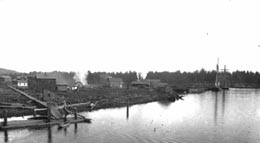On March 13, 1868, Samuel and Martha Benn trade their homestead at Melbourne, a community on the Chehalis River near Montesano, for land owned by Reuben Redman (Martha's father) at the mouth of the Wishkah River, the future site of Aberdeen. The Benns have an established farm at Melbourne, but can see the Wishkah River location's potential as a town site. Over the next several decades, through numerous land donations, the Benns will encourage Aberdeen's development as a lumbering and commercial center for Grays Harbor.
Journeys West
Samuel Benn (1832-1935) and the Redman families emigrated to Western Washington from the East. Samuel Benn grew up in New York City and as a young adult worked as a carpenter. In 1856 he went west to California to mine gold, but found more work as a carpenter building flumes for miners. He heard about gold on the Fraser River in British Columbia and set sail for Victoria in 1859. Upon arriving on Vancouver Island, he realized that the gold did not match the boosters’ claims and instead bought a boat and sailed to Olympia on Puget Sound. He and his cousin George Hubbard looked for likely places to settle and Benn decided on Melbourne, a small community of farmers on the Chehalis River. In June of 1859 he staked a claim to a homestead.
The Redman family, headed by Reuben (1820-1917) and Margaret Redman (d. 1852), lived in Polk, Iowa, in the early 1850s. They set out for Oregon Territory in 1852. Margaret died on the journey westward, but Reuben continued on with his children. After some moving around, including a stint in Eastern Washington, the Redman family settled at the junction of the Wishkah and Chehalis rivers in 1862.
Not long after their arrival, Samuel married Martha (1846-1917), Reuben’s daughter. She moved to the homestead with him and they started their family. Reuben Redman continued farming on the Wishkah.
Dreaming of a City
In 1868 the Benns and Redman decided to trade their properties. According to Samuel Benn’s reminiscence, published in 1907, he
"lived upon my ranch at Melburn [sic] for nine years and having become acquainted with the country and believing that some day there would be a great city on Grays Harbor and conceiving the idea that the place for that city was where the Wishkah river empties into the Chehalis, I located where the city of Aberdeen now lies" ("About Early Days in Aberdeen," 308).
Redman does not seem to have been interested in city building and relocated to the Melbourne farm. The land and sea surrounding Aberdeen teemed with marketable resources. Timber covered the land like a carpet, leaving hardly enough open space for homes and businesses. Fish, whales, and shellfish thrived in the coastal waters. But without a railroad or overland roads, attracting people to Aberdeen presented a challenge. For some time, the settlement remained a cluster of small farms.
Canning and Logging
To encourage development, Benn offered land to individuals willing to build businesses on the Wishkah. George Hume arrived in 1876 looking for a cannery site. Benn gave him land along the river for it. Hume ran it with a crew of Chinese immigrants who packed the fish caught by fishermen he brought up from the Columbia River. Hume soon sold the cannery to B. A. Seaborg and A. E. King, who owned the Aberdeen Packing Company that was headquartered in Ilwaco.
In July 1884 A. J. West and his family moved to Aberdeen from Michigan, where many of the forests had been exhausted from decades of lumbering. Benn gave land to West for a mill, and to J. M. Weatherwax, another Michigan lumberman, who arrived with his family in 1885. At first, most of the lumber was used in the area for building homes and buildings, but by 1886 the mills started shipping their lumber to outside markets, primarily San Francisco.
Benn further promoted Aberdeen’s development by donating lots to workers who helped build a railroad line to connect with the Northern Pacific Railroad’s Tacoma and Ocosta Line in 1894 and by selling other lots to residents on payments. In this way, the town gained permanent residents, in contrast to the hordes of loggers that passed through town between logging operations.
Samuel and Martha Benn raised their family of seven children in Aberdeen. They both survived to see their farm at the mouth of the Wishkah transformed into a booming town that sent lumber products around the world. Martha passed away in 1917. Samuel lived until 1935, dying at 103.

